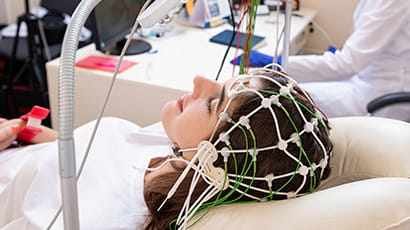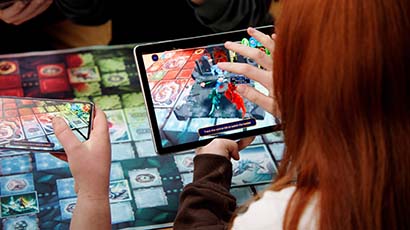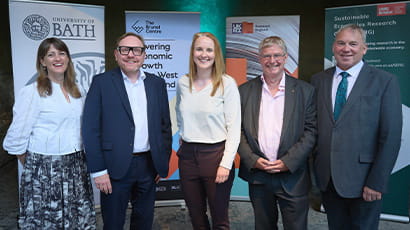Smart brick technology stars in installation at renowned London art gallery

Technology developed at the University of the West of England (UWE Bristol) features in an art installation in a major new show at a renowned London gallery.
'Smart bricks', capable of recycling wastewater and generating electricity from sunlight, have been developed by a team of scientists at the University as part of pan-European project bringing together living architecture, computing and engineering. The bricks, designed for buildings of the future to tackle sustainability issues, features in Is This Tomorrow? at Whitechapel Gallery.
UWE Bristol's work has been included in one of 10 new experimental multimedia projects responding to critical issues of today to offer speculative visions of the future. The technology forms part of an installation by artist Cécile B. Evans and Rachel Armstrong, Professor of Experimental Architecture at Newcastle University.
Their installation incorporates microbes that are found inside the 'living bricks' which can clean water, reclaim phosphate, generate electricity and facilitate the production of new detergents as part of the same process. The exhibition features 25 bricks, each of which acts as its own individual microbial fuel cell (MFC) containing real microbes processing wastewater from a 50l tank.
The bricks are being developed as part of the €3.2m Living Architecture project co-ordinated by Newcastle University working with experts from the Universities of the West of England, Trento and Florence, the Spanish National Research Council; LIQUIFER Systems Group and EXPLORA.
Professor Ioannis Ieropoulos, Director of the Bristol Bioenergy Centre (BBiC), at the Bristol Robotics Laboratory at UWE Bristol, said: "It's quite clear, from hard scientific facts, that our planet and our environment are suffering the consequences of centuries of unsustainable practices. Technologies like MFCs, which benevolently exploit the ability of microbes to transform waste into electricity, are examples of alternative means we should be exploring and developing for wider societal use. Is this Tomorrow? is a wonderful forum where this can be showcased as part of innovative exhibits that provoke thinking and it's a pleasure to work with Cécile B. Evans and Rachel Armstrong."
As well as the microbes from MFC technology, the installation incorporates a curtain of fog and other traditionally uncooperative elements within a framework dictated by absurd units of measurement. This includes the 13sqm surface area deemed as the minimum "acceptable" space for human living and the 999 years designated as the maximum period of occupancy for land within the UK. The installation asks, what can be achieved in spite of, and beyond, the structures that attempt to rationalise or even contain humanity?
Is This Tomorrow? follows 60 years on from the gallery's seminal This is Tomorrow exhibition, one of the most influential exhibitions in Whitechapel Gallery's history. Held in 1956, it grouped British architects, painters and sculptors including Eduardo Paolozzi, Erno Goldfinger, Richard Hamilton, James Stirling and Alison and Peter Smithson who worked together to present installations. It is now widely considered a watershed of post-war British Art.
The artists and architects invited to participate in Is This Tomorrow? were born after the original exhibition took place. Expanding the vision of the original exhibition and reflecting changes of the intervening years, they are based around the world and reflect an equal gender balance.
Is This Tomorrow? runs at the Whitechapel Gallery from 14 February until 12 May 2019.
The Living Architecture project is funded by the Horizon 2020 Research and Innovation Programme under EU Grant Agreement no. 686585
Related news

12 December 2025
UWE Bristol’s environmentally conscious and student-focused accommodation wins three awards
Purdown View, the world's largest certified Passivhaus student accommodation development, has been recognised at Property Week Student Accommodation Awards.

25 November 2025
Health-tech start up MyCelsius launches breakthrough cooling tech for hot flushes developed at UWE Bristol’s Launch Space
A pioneering Bristol-based health-tech company developing cutting-edge cooling technology for hot flushes has credited UWE Bristol’s Launch Space incubator with playing a key role in accelerating its product development.

14 November 2025
Lecturer wins prestigious Times Higher Education award for innovation in teaching
A senior paramedic science lecturer at UWE Bristol has been named the most innovative teacher of the year in the Times Higher Education Awards 2025.

13 November 2025
Alliance Medical and UWE Bristol launch UK’s first PET-CT postgraduate certificate
In a move set to transform imaging education, Alliance Medical (AML) and UWE Bristol have joined forces to co-design and develop the UK’s first PET-CT Postgraduate Certificate (PG Cert).

13 November 2025
New AI research to revolutionise animal welfare
A UWE Bristol research project will combine behavioural science and AI to create technology that understands not only what animals do, but how they feel.

29 October 2025
UWE Bristol academic unveils breakthrough in energy-efficient AI at NATO science forum
Dr Jonathan Lancelot has developed a new form of AI that could transform how intelligent machines operate in space, defence, and remote environments.

07 October 2025
Academic playing role in project to find hidden graves in Mexico using drone technology
A UWE Bristol lecturer is playing a part in a project using drone technology to locate concealed graves in Mexico.

01 October 2025
New funding for researchers to develop trustworthy clinical AI for assessing brain activity
Researchers have received funding from UK Research and Innovation to help bring their innovative brain-monitoring AI technology closer to real-world use.

11 September 2025
New study to investigate augmented reality as an intervention for emotionally based school avoidance
A UWE Bristol researcher will support a new study exploring whether an augmented reality board game can help young people with emotionally based school avoidance (EBSA).

22 August 2025
A decade of Future Space: How UWE Bristol’s enterprise zone is powering innovation and economic growth
Tracey John, Director of Research and External Engagement, reflects on the impact of Future Space and its role as a launchpad for cutting-edge companies shaping the future of how we live and work.

11 July 2025
Wound dressings developed with support from UWE Bristol to be launched by global firm
Technology that a team of UWE Bristol scientists helped develop to aid the healing of chronic wounds will be used in new ‘smart dressings’ being launched by global medical company.

03 July 2025
Research lab The Brunel Centre opens to power sustainable and inclusive growth for the West of England
A new data and research centre designed to support sustainable and inclusive growth and industrial strategy in the region, has officially launched.






